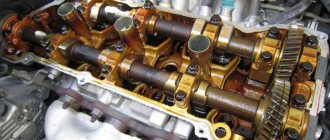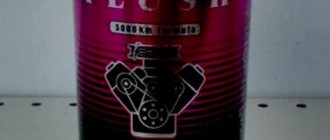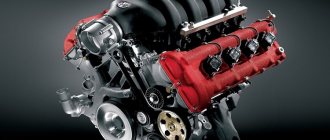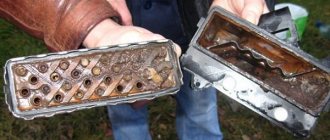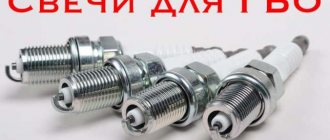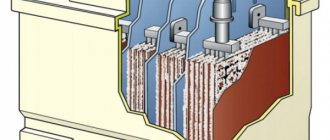The best additives for engine compression
Engine compression preparations do a good job of extending the performance properties of the unit. Additives can also repair small defects that arise during the operation of the engine piston system, which ultimately will help save on repairs and postpone engine replacement.
Resource Universal
The Resurs Universal additive, based on a nanoalloy of tin, silver, and copper, fills small cracks in the propulsion system. In addition, the product improves the functioning of the piston system and crankshaft. The recovery life of the product is up to 4 times on a unit with average wear from the very first start of the engine with Resurs Universal. Protects machine components during overheating, cold starts, sudden starts and braking. The product has international certificates of conformity and is recommended by foreign and Russian automakers.
Advantages
- Improves dynamic performance;
- Effective in engine diagnostics;
- Improvements are noticeable immediately;
- Low price.
Flaws
- Does not reduce fuel consumption as promised by the manufacturer.
Buyers claim that Resurs Universal is not inferior to imported analogues, and it is cheaper. This means there is no point in overpaying.
ABRO OT-511-R
A high-quality and expensive additive that contains only the best components. They provide a long service life, prevent the formation of new scratches and eliminate old microcracks. Thanks to the excellent composition, compression and engine power are increased.
Advantages:
- High efficiency;
- Unique composition;
- Increases the efficiency of the internal combustion engine;
- Compatible with all oils.
Flaws:
- There are many cheap fakes.
Bardahl Full Metal
The additive is recommended for use in problematic engines. Thanks to its restorative properties, it prevents the occurrence of microcracks and also reduces scoring that appears on the cylinder wall. These actions help waterproof the piston.
The product also protects internal combustion engine elements during a “cold” start, when the engine oil has not yet had time to penetrate the cylinder walls.
The composition contains carbon molecules that are 10 times stronger than steel. They have a solid spherical shape that can withstand any negative impact. Due to the absence of solid particles in the liquid, it does not clog the engine and oil filter.
Advantages:
- Belgian quality;
- Extreme protection;
- Restores compression;
- Prevents oil from entering the combustion chamber.
Flaws:
- Price.
Suprotek Active
The reducing additive Suprotek Active helps to extend the service life of the engine. Suitable for petrol units. Recommended for cars with a mileage of no more than 50,000 kilometers. The engine oil additive does not change the quality lubricating properties of the oil and forms special microfilms that reduce friction. For slightly worn units, Suprotek Active’s ability to fill small gaps in places where friction occurs will be relevant.
Advantages
- Suitable for many cars;
- Slightly restores the surface of worn parts;
- Makes cold starting easier;
- Presented in many auto stores in Russia.
Flaws
- Some buyers did not notice a positive effect.
Reviews of the Suprotek engine additive are mostly positive. Car owners who have tried Suprotek Active on cars of different brands note that the drug is especially effective for domestic cars.
Types of additives for increasing engine compression, their advantages and disadvantages
High-quality additives for oils or fuel can reduce wear of components and parts and increase compression. There are quite a lot of types:
- Remetallizants are additives containing ions of soft metals (copper, tin, cadmium). They form a protective thermomechanical coating on the surface of the parts.
- Additives containing Teflon.
- Conditioning additives. They are made from chloroparaffin compounds, which break down substances formed during wear of parts. In addition, these additives contain a high content of fluorinated polyesters, which provide a protective thermomechanical coating for rubbing surfaces.
- Layered friction modifier additives. A layered layer containing molybdenum, tungsten, and graphite is formed on the parts. This layer is characterized by low shear forces, providing a low coefficient of friction to increase the service life of parts.
- Additives-geomodifiers. Contains serpentine, graphite, magnesium, and forsterite compounds. When friction occurs, serpentine begins to decompose, releasing energy that heats and softens the metal. A complex chemical reaction begins, as a result of which a composite ceramic-metal layer with high wear-resistant and strength characteristics is formed on the surfaces
All of these supplements have both positive and negative sides. They are compared in the table:
The best additives for gasoline engines
Additives for vehicles that run on gasoline should be changed every 2-10 thousand kilometers. They are divided into two categories:
- additives for carburetor engines;
- additives for injection power units.
The latter must have binding properties and allow you to get rid of water that has gotten into gasoline. Additives for carburetor engines also provide protection against icing.
Liqui Moly Speed Tec
The Speed Tec additive is used to improve the performance of two- and four-stroke gasoline engines. The additive contains no metal particles, which makes it safe for the engine, regardless of operating conditions. The product acts quickly, increases the efficiency of fuel combustion, and one can is enough for 70 liters of gasoline. PROS:
- absence of organometallic compounds, which is why Speed Tec can be considered safe at any engine load;
- higher power and improved engine performance;
- cleaning the exhaust system.
Minuses:
- Low efficiency when used together with high-quality fuel - for example, AI-95 or AI-98.
The additive performs best when used with average quality gasoline.
LIQUI MOLY Octane Plus
In this section of the rating of the best automobile additives, the first place goes to Liqui Moly - the octane corrector of this company, raising the price of a liter of fuel by eight and a half rubles (which is unpleasant, of course), is capable of giving a real increase in octane number - for example, increasing the marketable "ninety-second" ” to the real condition of “ninety-five,” and the clearly substandard “Vasily Alibabaevich cocktail” to the state of “you can go.” At the same time, judging by the carbon deposits on the candles, the additive does not have a negative effect on them - thank God, they did not mix banal ferrocene into the jar.
Let us also note the concern for the buyer, traditional for Liqui Moly additives: the jar comes with a funnel that will allow you to easily pour the contents even into a narrow neck with a valve.
Main advantages:
- Efficiency
- Ease of use
Minuses:
- Price
Lucas Oil 10131
The main task of the Lucas additive is to improve lubrication parameters for gasoline engines. The product prevents dry starting and provides protection for any modern engine, including the most powerful ones designed for car racing. The additive can withstand extreme operating conditions, and it should be changed no more often than after 20,000 km. PROS:
- high quality manufacturing, despite the fact that the stabilizer is produced in the USA and meets all the fairly strict requirements of this country;
- effective elimination of vibration and noise of a car engine;
- temperature control of the power unit.
Minuses:
- High price;
- Rarely found not only in regular retail outlets, but even in online stores.
- It negatively affects the quality of the oil, which has to be changed more often.
Hi-Gear SMT2
To increase the service life of a gasoline engine, you can also use the Hi-Gear SMT2 additive. The additive includes a special air conditioner that reduces dynamic loads on the power unit. Tests have shown that the engine lasts at least 2 times longer. PROS:
- the use in the manufacture of the additive of a special high-tech formula that prevents oxidation and the release of gases from the combustion chamber into the crankcase;
- improving the anti-scuff and viscosity properties of oils, reducing their “burn”;
- fuel economy;
- reducing the sound of valves and acoustic noise from the engine;
- increasing the service life of a worn-out power unit by 1.5-2.5 times;
- Compatible with gasoline engines of any generation and type.
Minuses:
- Relatively short duration of action of the additive.
RVS Master additives for two-stroke engines: many advantages
RVS compositions are really good. And we want to explain this in more detail. RVS Master, consisting of high-quality materials, does not enter into chemical reactions with fuel and oil and retains their original composition. The additives do not in any way affect the condition and operation of seals and gaskets, and after application they add up to 60,000 km to the engine. As a result, fuel consumption is reduced by approximately 10%. What’s interesting is that conventional additives only last for a refill. With each new refueling it is necessary to add them again. And this is many times worse than in the case of RVS.
Despite the higher cost of RVS Master compared to other additives, complex and long-term use of RVS is slightly cheaper. The second use of RVS does not require additional purchase of supporting products. The RVS additive is cheaper in 2 cycles and has a long-term effect.
The best additives for diesel engines
For cars running on diesel fuel, additives are needed no less than for gasoline vehicles. This is especially true for cars that have been in operation for several years - a large amount of soot has already formed in their exhaust system, and fuel consumption has noticeably increased. Special additives allow you to optimize engine performance, improve fuel parameters and reduce fuel consumption.
LIQUI MOLY Diesel Flies-Fit K
The promise of reducing the pour point of winter fuel to -50 degrees on the can is, of course, good, but let's take a closer look. Since Liqui Moly antigel is a concentrate, the high price per liter is actually not that high: the instructions indicate that one measuring cap (25 ml) should be poured into 25 liters of fuel. Simply put, a liter can, when used according to the instructions, will allow you to “adjust” a thousand liters of fuel, increasing the price of each liter by a ruble and kopecks, which is not so much.
As for the pour point, you need to understand that for anti-gels this is more of a publicity stunt - the most important thing for us is the maximum filterability temperature, because what does it matter to us that the fuel has not yet frozen if the booster pump is no longer capable of pushing it through the filter? But here the technical documentation is much more modest, indicating that “depending on the quality of the diesel fuel, the filterability limit temperature improves by -10 °C.” In practice, we can talk about 6-7 degrees of gain for “average commercial” diesel fuel. Not so much? In fact, this is a good result for an antigel, especially taking into account the fact that the additive reduces the cetane number minimally - and often it is precisely this that antigels hit very sensitively, which, for example, for modern diesel engines with common rail, multi-component catalysts and particulate filters is already extremely undesirable. To protect against cold weather in the off-season on summer diesel fuel, Liqui Moly is enough. In addition, do not forget that the concentrate can be used at lower temperatures (from -25 to -35 degrees) and in a ratio of 1:500: more expensive, but more reliable. The additive quite clearly increases the lubricating properties of the fuel - and this is only beneficial for the high-pressure fuel pump or unit injectors.
Main advantages:
- Overall normal efficiency
- Low impact on cetane number
- Low price per liter of processed fuel
Minuses:
- No critical
Castrol TDA
Suitable for engines that run on diesel fuel. With its help, the corrosion process slows down and the negative impact of fuel components on fuel system parts is reduced. And this product, suitable for any season, will be most effective when used in winter. PROS:
- the ability to optimize the process of starting the power unit at any time of the year - although the effectiveness of the additive increases in winter;
- no effect on fuel viscosity and increase in its lubricating properties;
- reduction of noise and soot formation from a car engine.
Minuses:
- Less effective when using the additive in the warm season;
- As the dosage increases, the risk of rapid contamination of the fuel filter increases. To solve this problem, filter elements have to be changed several times more often.
ASTROhim Antigel
Our rating of the best diesel fuel additives ASTROhim Antigel continues. “Multiple test winner” (as proudly stated both on the packaging and on the manufacturer’s website) is available in a variety of packaging - from 300 ml bottles to 200 liter barrels. The most difficult thing to understand is the compact “passenger” packaging, since there are already three options: the same 300 ml can be designed for 30 liters of fuel (code AC-119), 60 liters (AC-120) and 120 liters (AS-121). As a result, if you are not careful, you can make a mistake, because in these three options the concentration of the concentrate itself (sorry for the tautology) is different.
In general, the composition is quite cheap - taking the same liter jar for comparison with Liqui Moly (devoid of a measuring cup and funnel, unlike the German competitor), we get an increase in the price of a liter of fuel at the specified concentration of approximately 97 kopecks: slightly less than that of Liqui Moly , but not critical. What about the characteristics? Well, the additive significantly reduces the pour point of the fuel, deteriorates the cetane number slightly... but the maximum filterability temperature does not decrease much, that is, we have more of a “defrost” of fuel than a full-fledged antigel, which should also prevent the crystallization of paraffin . As a result, overall, we will probably leave Astrokhim without first place this time.
Main advantages:
- Low price
- Low impact on cetane number
- Improving the lubricating properties of fuel
Minuses:
- Confusion with 300 ml packaging
- Inconvenient dosage
- Not the best reduction in filterability limit temperature
Hi-Gear Diesel Antigel
The American-made product provides improved diesel fuel performance without a noticeable increase in costs. By adding an additive to summer grades of fuel, you can increase their pour point to -27 degrees, and to -51 degrees for winter grades. The effectiveness of the product has been tested and confirmed by specialists from different countries, including Russian automotive experts. PROS:
- effective reduction of fuel filterability level and gelation temperature;
- safety during use - the dispersant additive does not lead to engine failure even under extreme engine operating conditions;
- affordable price compared to products of other brands - depending on the concentration, from 1 to 3 rubles are spent on processing 1 liter of fuel;
- absence of fakes on the market.
Minuses:
- The can's ill-conceived dosing system.
- There is a strong change in properties after the expiration date, so it is recommended to use the product only within the period specified by the manufacturer.
Diagnostics using instruments
If there are indirect factors for a drop in pressure in the cylinders, instrument diagnostics should be carried out to confirm the problem and identify the causes that caused it. Any car enthusiast should have at his disposal devices and tools that allow him to carry out at least minimal engine diagnostics. To confirm the pressure drop in the cylinders you will need:
- a device for measuring pressure in the engine (called a compression gauge);
- several keys (including for possible removal of the cylinder block cover);
- syringes.
Every car owner should always have this simple set of tools at hand. The most accurate data is provided by a compression meter. It is more convenient to take measurements together with a partner. Before using it, you need to warm up the engine. After this, all the spark plugs are unscrewed one by one, the fuel supply is shut off (the fuel hose is removed), the tip of the compression gauge is screwed or pressed (it all depends on the model) to the spark plug hole.
Next, the driver begins to turn the starter, and his partner, at a signal, begins to monitor the instrument readings. The starter should be turned until the arrow stops creeping up. After that, the compression meter data is recorded on paper. So you should check all the cylinders.
The recorded readings are compared with standard indicators (each car model has its own, usually in the range of 10-15 Atm.), which makes it possible to determine whether there is a drop in pressure in the cylinders, and in which one(s). Usually in the problem cylinder the pressure is sharply different from the rest. Having established the source of the problem, you can disassemble the cylinder block and check for wear.
The best additives to reduce oil consumption
Additives that promote oil consumption help to change it less often and preserve its properties longer. The motor also receives additional lubrication, which has a positive effect on the longevity of the machine.
VMPAUTO Resources Universal
A quality engine product that will reduce oil and fuel consumption, as well as reduce vibration. Designed for use with motor oil. It is advisable to change the filter before use to ensure higher efficiency. Next, you need to warm up the car to operating temperatures and turn off the engine. Shake the contents of the bottle for 20 seconds and pour into the oil neck. Start the vehicle and let it idle for 15 minutes. The substance will extend the life of the internal combustion engine and ensure reliability.
Advantages:
- Reduces vibration;
- Reduces the formation of soot;
- Easy to use;
- Price.
Flaws:
- Bad opening ring.
1 Stage Atomic Metal Conditioner (XADO)
This Ukrainian product is distinguished by the stated effects of reducing the coefficient of friction of automobile parts, leveling acquired micro-notches on metal parts, increasing the value of engine compression and its overall resource.
According to the test results, it turned out that the specified effects actually take place, but to a slightly lesser extent than indicated by the manufacturers. The effectiveness of the composition is largely related to the type of oil used in the car and the general technical “health” of the engine.
Another nuance is that the effectiveness of the additive can only be observed after a fairly long period of use. At the same time, the price of the additive is high for fairly average indicators.
Car owners also noted that the instructions for the additive contain a lot of complexly written points, which can be difficult to understand.
Xenum VX300
This is a fully synthetic composition with microceramics, which can be used in both motor and transmission oils (again, excluding automatic transmissions!).
The manufacturer claims efficiency per 100 thousand kilometers, but in reality this figure is much lower and depends on the quality of the oil and the condition of the engine.
The packaging is enough for a car oil system up to 5 liters. Xenum is produced in 300 ml volumes and costs about 950 rubles.
What are the cylinder compression standards for VAZ engines?
Engine specifications must indicate “minimum cylinder compression values.” If you cannot find such data, determine the compression standards yourself using the formula:
| Compression (kgf/cm2) = compression ratio (see technical specifications of internal combustion engine) * coefficient (for VAZ min 1.2, max 1.3) |
A few examples:
- The compression ratio of modern VAZ 21126 and VAZ 21127 engines installed on Granta, Kalina and Priora is 11. We multiply the values using the formula and get the compression standards: 13.2..14.3.
- For the Vesta engine (VAZ-21129) the compression ratio is 10.45, the compression standards will be: 12.5..13.6.
- For Niva (VAZ 21213, 21314) - 11.3..12.2.
If the compression gauge values in all cylinders are within the normal range, this does not mean that everything is fine. Different compression in the cylinders is also bad
It is important that the difference between all readings is minimal. Compare the minimum and maximum compression values in the cylinders
According to technical standards, the difference should be no more than 1 kgf/cm2 or 10%.
And also interesting: TOP 10 rare VAZs | Popular Mechanics Magazine
The best additives for cleaning the fuel system of a gasoline engine
This group of additives affects the entire system, cleaning from the fuel tank to the injectors. In this case, carbon deposits are removed from the surfaces of the combustion chamber and other elements.
Suprotec Active Plus
It is used for any gasoline and gas engines (including forced and turbocharged ones) with a mileage of over 50 thousand kilometers, that is, those that have been fully run-in. The average cost of one 90 ml bottle is 1,400 rubles. One bottle is enough for one stage of engine treatment with an oil volume of up to 5 liters. For engines with an oil volume of up to 10 liters, 2 bottles are required. For normal processing in 3 stages, 3 or 6 bottles of the product are needed, depending on the engine size. Detailed instructions are provided on the official website.
The Suprotek additive is the best protection and restorative agent for serviceable automobile engines operating under various conditions. Of course, no composition will remove the bullies, no matter what the manufacturers promise, but Suprotek does not allow new ones to appear. Also, a 100% effect is observed if you need to clean the engine from dirt. Pouring additives into a fully serviceable engine increases its service life under normal conditions by 60%.
Reagent 3000
Designed to activate the catalytic fuel system with catalyst metal ions. This contributes to more complete and high-quality combustion, increased power and reduced fuel consumption by up to 25%!, reduced CO/CH and soot in the exhaust gases, reduced likelihood of burnout of valves and pistons and increased service life of spark plugs.
The composition cleans the nozzles of injectors/nozzles and the combustion chamber, decarbonizes the upper compression rings, restores the performance of the fuel injection pump and reduces its wear, protects the engine from the use of low-quality fuel, cleans and restores the functionality of the λ-probe and the exhaust gas afterburning catalyst.
It is recommended to use regularly. For more rational use, use the “3 in 2” scheme (3 times in a row for 3 full tanks, followed by skipping 2 applications), since the composition has a prolonged effect on 2 subsequent full fuel tanks, that is, a total of 500 liters
Autool C100
An effective system for flushing the fuel system of gasoline engines using any cleaning solvent. In the process of cleaning the injector, the parts of the cylinder-piston group and valves are also washed and coke deposits in the working part of the injectors are reduced, which entails fuel savings and restoration of engine power.
Autool C100
The kit includes corrosion-resistant tubing, which allows you to work with any cleaning solvent for fuel systems. Works with any source of compressed air - a pneumatic line or a regular household compressor for inflating tires. The kit includes a pressure gauge for monitoring pressure and a reducer for adjusting it. It takes about half an hour to wash.
What additives are best to pour into a diesel engine?
If you have a car with a diesel engine, its compression may decrease over time, the car begins to operate noisily and smokes. What additives are best for a diesel engine? Let's figure it out.
- AS-627.
The Russian manufacturer ASTROhim has developed the most budget-friendly additive for AC-627 engines. It can be added to oil; it is suitable for use on diesel and gasoline power units.The additive shows itself best in engines with high mileage. The composition reduces gaps that appear as a result of severe wear of engine elements. This allows you to seal the pistons in the cylinders on a diesel car.
Thanks to the use of the additive, compression is improved, not only on passenger cars, but also on trucks, special, construction and agricultural equipment. The additive can be used with all types of oils; during operation, the composition helps maintain the best balance of the lubricant.
Russian car enthusiasts claim that, despite the low cost, the AC-627 additive improves car compression, the diesel engine starts easily, and its power increases.
- RESURS diesel.
Among the best additives for restoring engines that run on diesel fuel is the domestic remetallizing additive RESURS diesel.Just add it to the oil when you change it and the oil filter. The additive is not afraid of the effects of centrifuges and turbines, and eliminates dry friction when starting a cold engine, as well as under increased loads.
The manufacturer of the additive claims that with its help you can extend the service life of the engine up to 20,000 km, and the turbocharger by 1 year. What other benefits do you get from using a remetallizant additive? Oil waste is reduced by 5 times, the car consumes 10% less diesel fuel, and compression increases by 40%. The additive can be used when the car's mileage is more than 60,000 kilometers.
RESURS diesel has gained great popularity among car owners. They note that engine power increases, noise decreases, and engine starting is easy.
- Suprotec – tribotechnical composition “Active diesel”.
"Suprotec Active Diesel" consists of fine mineral powders with a unique composition, the fractionation of which is selected in a certain way. Thanks to this, a layer is formed on the inner surface of the motor that prevents friction and wear.Compared to other oil additives, which improve gliding but must always be added to the lubricant, the tribotechnical composition "Suprotec Active Diesel" is poured once or regularly, but for a long time.
This additive acts comprehensively: carbon deposits are removed from the surfaces of the engine, as a result it works better and wear is reduced. After this, a protective nanofilm with a reduced coefficient of friction appears, at the same time micro-scratches on the surface of the motor are smoothed out.
Which additive is better for an engine if it is quite worn out, but there is no excessive oil consumption, there is no increased pressure of crankcase gases and the compression is 8 kg/cm2? In these cases, the tribotechnical composition “Suprotec Active Diesel” is ideal. .
After using the additive, the engine will work better. Many car owners note that the car begins to consume less fuel, noise decreases, and engine life increases. The car accelerates quickly. However, if the power unit is “killed,” the tribotechnical composition “Suprotec Active Diesel” will not help, but the manufacturer indicates this on the packaging.
- Bardahl Full Metal.
Thanks to the cutting-edge developments contained in the Bardahl Full Metal additive, produced in Belgium, it is possible to improve the performance of even the most worn-out diesel engine.Bardahl's patented Polar Plus technology improves oil film adhesion. The car can stand in the cold for a day, but the lubricant will remain on the surface of the motor, making the gaps in the piston group smaller. Due to the oil film, friction in highly loaded components (crankshaft, camshaft) will decrease.
Which engine additive is best to reduce diesel fuel and oil consumption? Without a doubt, this is Bardahl Full Metal. With its help, the concentration of soot and burning in the exhaust gases will decrease, and the car will stop smoking. The additive does not contain solid particles, which means that the oil filter, as well as the internal cavities of the engine, will not become clogged.
Many car owners note that the use of Bardahl Full Metal makes it easier to start the engine and increases power. A diesel car will stop smoking. The only disadvantage of the additive is its cost.
We recommend
“Fuel consumption of a diesel car: what affects it and how to avoid an increase” Read more
Which additive is better
Yes, automobile additives make the life of the engine easier, but in each situation you need to look at the condition of the engine. So, if your car is from a showroom or has low mileage, then additives from the group of geomodifiers are perfect for you. But if the engine has a high mileage, then powerful Hodo-type additives, which contain “microceramics,” will come to your aid. The latter reduce oil consumption due to waste and reduce fuel consumption.
Having looked through a bunch of forums, you involuntarily come to the conclusion that car enthusiasts give their preference to Liqui Moly additives, since they have stood the test of time, and to this day in the same aviation they use additives based on the molybdenum sulfide already mentioned above.
We restore worn areas... using innovative methods and materials
And precisely because the tightness of contact between the rubbing parts of the engine’s cylinder-piston group is lost, one often has to solve the problem of how to increase engine compression on one’s own. In principle, nothing complicated, taking into account the fact that there are numerous additives on sale for restoring friction areas in the area of the cylinder-piston group of the engine.
They really (if the malfunction is correctly diagnosed) can turn out to be very useful, and increase compression by an order of magnitude, increasing the pressure in the engine cylinders.
Rules for choosing engine additives
Manufacturers of various additives are confident that the product they sell can increase the service life of the engine.
However, the opinion of Russian car owners about the properties of additives is divided. Some believe that the additive saved them from major engine repairs. Others are sure that this is a waste of money. Obviously, even the best engine additive will not help if the engine is completely worn out.
The use of the additive is preventive in nature and allows you to eliminate minor breakdowns in the engine.
The additives produced today are highly specialized. Information about what exactly they are intended for is contained on the packaging. But rarely does anyone read the instructions from the manufacturer; usually the car owner simply fills in the additive, but what he gets is not at all what he expected. Which engine additive is best? To answer this question, you need to consider the following points:
- Decide what you need the additive for . If an engine consumes too much oil, it does not need a compression additive. Better choose sealants.
- The additive will help if the car is noisy and smokes . The main thing is to choose an additive that is suitable for your engine. What is important here is both the type of engine - gasoline or diesel - and the oil - mineral, semi-synthetic, synthetic.
- What additives are best for engine restoration if the car service center told you that the engine is “killed” ? This is where a remetallizant additive can help. It contains metal microparticles that protect the engine surface from the inside. Thanks to this additive, the gaps will become smaller, the car will start easily, and traction will appear. However, such an additive will not last long: several tens of thousands of kilometers.
To find out which engine oil additives are best, read the review below. The top best additives include only those additives that have gained popularity among Russian car enthusiasts.
Oil additives to increase pressure
Today, one of the most popular additives are detergents or detergents. They act as follows: after adding additives to the car oil, they prevent soot and varnish deposits from settling on the surface of important parts. If nothing is done, suspended particles collect in crystalline formations. They are attached to moving parts. It is not difficult for them to break the oil film and increase friction between metal elements. Parts quickly wear out and break. Detergent additives can break down deposits into oil-soluble particles. This detergent prevents the formation of new stains in the future.
“Atonium” increases engine power and reduces fuel consumption.
The next reason for poor oil flow to engine parts is its thickening. When the temperature outside is sub-zero, the consistency of the lubricant may become jelly-like. In this case, all-season lubricants will come to the rescue. They contain a sufficient number of various additives that are guaranteed to ensure engine safety. For those car enthusiasts who use low-quality oils, additives called “antifreeze” are suitable. The next reason why lubricating fluid does not move well through special channels leading to metal parts is a small leak of material into the engine crankcase. The lubricant does not completely fulfill its purpose. The leak must be eliminated.
If the leak becomes large, then the seals or gaskets need to be replaced. They are inexpensive, but the process of extracting them is quite labor-intensive. Products used to restore rubber and plastic parts increase their volume. In this case, the sealing of the holes remains the same. There are additives on the market that replace oil film. Many motorists note the impracticality of such means. The lubricant to which they are added loses its effectiveness. It differs from others in its fragility.
However, experts advise not to get carried away with such means. A huge number of additives in one container increases the risk of conflicts between different substances.
When to use
Let's compare the additive with tablets. You will not use medications unnecessarily, even if everyone around you praises them and convinces them of their incredible effectiveness and excellent healing effect. The same should be done with auto chemical goods; use additives, adding them to an engine with high mileage, only when the need arises. Experienced drivers consider auto chemicals, which are poured into oil for a diesel or gasoline engine, as a lifeline. If you begin to notice that your engine is not in order, you will only have a few options, from which you will have to choose the most suitable one:
- carry out expensive repairs of the internal combustion engine;
- purchase a new internal combustion engine (we note right away that buying a used engine is not recommended, since you can buy a “pig in a poke”; after installation on your car, it may turn out that it is also in poor condition);
- add the additive to the engine oil.
The most affordable option of the three listed is the introduction of a “miracle cure”. In addition, you can get instant results, whereas repairs are not carried out in one day, nor is installing a new engine. A high-quality additive can revive the engine and allow the car owner to continue using the vehicle for some time, during which the motorist will have time to accumulate the required amount for repair work.
What are additives and their purpose
Additives for automobile engines are lubricant additives that, according to manufacturers, should improve engine performance. Before using such products, you need to learn everything about additives in car engines - this will prevent damage to parts due to the use of the wrong product.
Why are automotive additives needed:
- the lubricity of motor oil is improved;
- high-quality protection of the moving parts of the motor is ensured;
- engine reliability increases and the risk of engine breakdowns is reduced, especially in the cold season.
It happens that car oil becomes coked, and deposits appear on the elements in contact with it. As a result, the quality of lubrication of the moving elements of the motor deteriorates. For this case, there are additives in internal combustion engines that really help clean the oil of contaminants that cannot be eliminated simply by replacing it.
On a note!
When choosing car additives, take into account the type of car, the condition of its engine, type and fuel consumption
You also need to pay attention to the chemical composition of the product, manufacturer’s warranties and price category.
Additives to engine oil must meet the following requirements:
- complete dissolution;
- lack of reaction to water;
- impossibility of settling on oil filters;
- corrosion prevention;
- moderate cost - if additives are expensive, adding them is not economically feasible.
Additives are often used to reduce the consumption of automobile oils. By changing the properties of lubricants, additives help reduce their consumption - the engine consumes them less intensively.
The “old-fashioned” method, or restoring engine compression using oil
To increase compression in such a case, one hundred grams of pure engine oil should be poured through the socket in the engine block (where the spark plug is mounted on a given cylinder). And leave for half an hour. Clean motor oil will simply soften, soften the accumulated carbon and soot (this is the mass that forms in the cracks where the rings fit on the pistons, like a black, hard coal mass), and then, when the engine starts, an increase in compression will be evident. That's it, the sealing rings are “decarbonized”.
True, if the ring is jammed due to a crack, then this method can help for a very short time. And you shouldn’t do this; it’s better to immediately contact a specialist - a motor mechanic.
Be that as it may, modern engine compression additives are an excellent tool that can significantly increase the service life of even an extremely worn engine. Which otherwise would have to be disassembled and a full overhaul done. With crankshaft grinding, with new liners (depending on the engine type), with replacement of pistons, liners, and so on. In this regard, additives for increasing compression are a real salvation. Moreover, they bring significant benefits to a brand new, unworn engine.
What else is worth reading
Carbon deposits on the spark plug insulator
How to measure engine compression
Characteristics of motor oils by viscosity
Why does the engine stall when cold, when hot, during startup and acceleration?
How additives work
Compression additives work on a similar principle. First of all, they are catalysts that accelerate crystallization on engine surfaces. When added, a protective film is formed on the rubbing parts, which reduces the load on the power unit. The use of additives helps restore the crystal lattice of metal parts. When disassembling a motor that worked with the addition of an additive, it is clear that all components have a smooth mirror surface. As a rule, additives are used to increase the compression of the internal combustion engine after 60 thousand kilometers. This allows you to save all components from wear. Motorists highlight the following advantages of using the additive:
- aligning and increasing cylinder compression;
- increase in oil pressure;
- elimination of coking.
Another undeniable plus is the delay in major car repairs. There is also a noticeable slight reduction in fuel costs, which has a positive effect on savings over long service life. So, we have become familiar with the principle of operation, now we need to figure out what types of additives there are.
Causes of the problem and diagnostics
The reasons that the cylinders do not have sufficient compression can be the following phenomena:
- Occurrence, wear of piston rings. Normally, these parts remain movable in a groove on the piston. When the piston moves, they fit tightly to the cylinder walls and prevent oil and exhaust gases from entering the combustion chamber. When the grooves are coked, they lie tightly and lose mobility, which leads to contamination of the chamber. The problem can arise in the absence of warming up, frequent driving at low speeds and the use of low-quality motor oil. A cylinder with such a malfunction fails at low speeds.
- Deterioration of the cylinder-piston group, formation of scuffing on the piston. When cylinders and piston rings wear, openings appear through which oil and air enter the combustion chamber. At the same time, engine power decreases, oil consumption increases, and the exhaust turns dark blue. When scoring occurs, engine idle operation becomes unstable.
- Defects, breakdowns and burnout of valves. Refueling with low-quality fuel leads to contamination of the cylinder head. As it is used, the carbon layer begins to interfere with the operation of the valves, which leads to the formation of a gap at the entrance to the chamber. Valve burnout occurs when the ignition is set incorrectly, when fuel begins to burn in the exhaust tract. When deformed and burnt out, the cylinder loses functionality at low speeds. When the damper is open, the compression pressure decreases by 2-10 times, and when it is closed, it disappears completely.
- Burnout of the layer in front of the cylinder block. Regular overheating, low-quality fuel and components can lead to burning of the gasket that ensures the tightness of the connection.
- Camshaft wear. The exhaustion of the shaft prevents the valves from fully opening and closing. Pressure may be lost due to gaps and subsequent defects in the valve system. The cylinder loses functionality at low speeds, although compression is partially maintained even with the throttle closed.
- Piston burnout. This problem is often observed on sports cars that are driven under high load and fueled with high-octane fuel.
Types and properties of engine additives to increase compression
After using the car for a long time, owners notice a deterioration in engine performance. Mostly domestic cars are subject to changes, the engine capacity of which is from 1300 to 1500 cm³. Over time, noise appears, starting deteriorates, and power drops, regardless of the quality of the fuel and oil used. The main reason for the deterioration of engine performance is a drop in compression. This can be prevented by using supplements. Using an engine additive to increase compression helps. They work on a similar principle, but differ in composition. First, let's look at the reasons for the drop in compression in the engine.
Signs of loss of compression
Symptoms of low compression may include:
- increased fuel and oil consumption, rapid onset of oil starvation due to untimely maintenance;
- reduction in engine power at low speeds;
- blue or gray exhaust smoke due to rapid contamination of the combustion chamber;
- unstable operation of 1 or several cylinders at low speeds;
- launch difficulty.
The compression value characterizes the force of compression of the fuel-air suspension in the cylinders. For a standard engine, weak compression is noticeable at low speeds and cold weather starts.
For diesel engines, the decrease in the indicator is more critical, because ignition of the fuel in them occurs due to sudden pressure.
